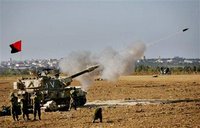The Guns of July
 Suddenly, the guns are blazing and the bombs are falling from Gaza to Beirut.
Suddenly, the guns are blazing and the bombs are falling from Gaza to Beirut. Israel responds to the kidnapping of three of its soldiers with all-out military offensives.
In the case of Gaza, there is little doubt that one is deliberately trying to destroy the Palestinian Administration there, counterproductive as that is likely to be.
In the case of Lebanon, the Israelis government is saying that it is making no distinction between the actions of Hezbollah and those of the government of Lebanon, thus proceeding to bomb Beirut Airport and all the country’s links with the outside world.
It’s difficult to see that the effects are going to be anything but highly damaging to the highly fragile political fabric of Lebanon. Israel is bombing the fruits of the celebrated Cedar Revolution into oblivion, with Washington hardly being able to do more than mutter.
It might well be that we are seeing the hand of Damascus and Teheran behind what Hezbollah did in its raid on Israel. It was an obvious strategic move to relieve pressure on the Hamas-lead government in Palestine due to the situation in Gaza.
If that is the case the risk of further escalation is very serious indeed. Damascus has every reason to want Lebanon to disintegrate, thus bringing its influence back. And there might well be elements in Teheran that might see the opportunity to use the obvious pressure points in Iraq and Afghanistan as well.
And Washington seems to be lost. There has not been much of coherent and long-term policy visible there since the Hamas victory in the Palestine Authority elections in January. It’s all been reaction to events – and reactions often without much of long-term purpose.
One has not been explicitly supporting everything coming out of Israel – but neither has there been much of a serious policy effort to fend off the deterioration that, the one way or the other, was in the cards. Policy has been seriously and dangerously drifting.
And now the guns of July are blazing.
Somewhat hidden by the noise of the guns and the bombs has been the decision to take Iran back to the UN Security Council as a reaction to its refusal to react to the package that the EU3 and the US put on the table a couple of months ago.
While there seemed to be a somewhat hopeful atmosphere then, things are very different now. One can well see the hardliners in Teheran arguing for their policies of confrontation.
They probably see the US as weak rather than strong – and with the policy drifting and the military seriously overextended, that’s not unfortunately too far from the truth.
I don’t think there is anyone daring to predict where we are heading. We have suddenly entered a cycle of escalating violence which could rapidly spiral out of control.
It’s a truly dangerous situation – and it affects the entire region from Kabul to Cairo.


<< Home